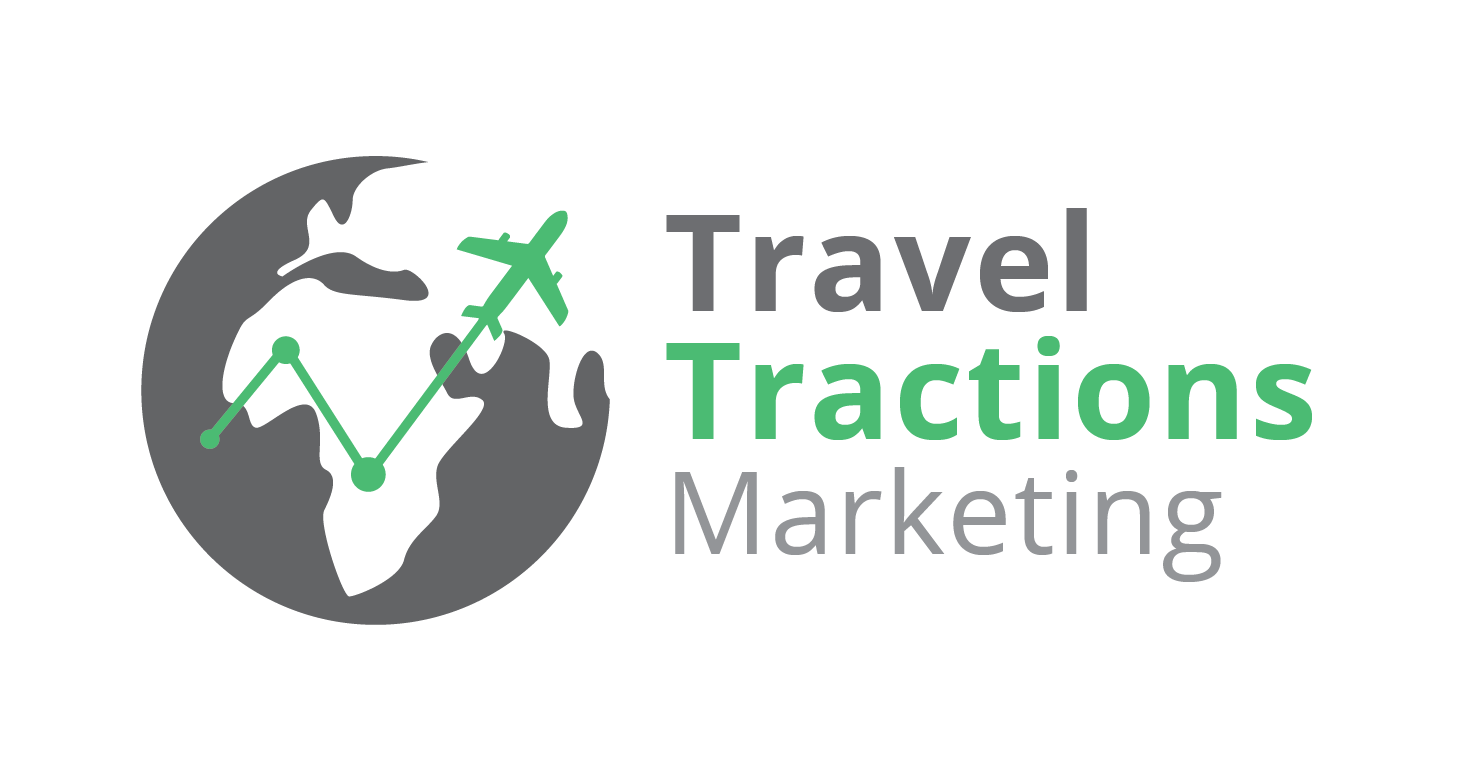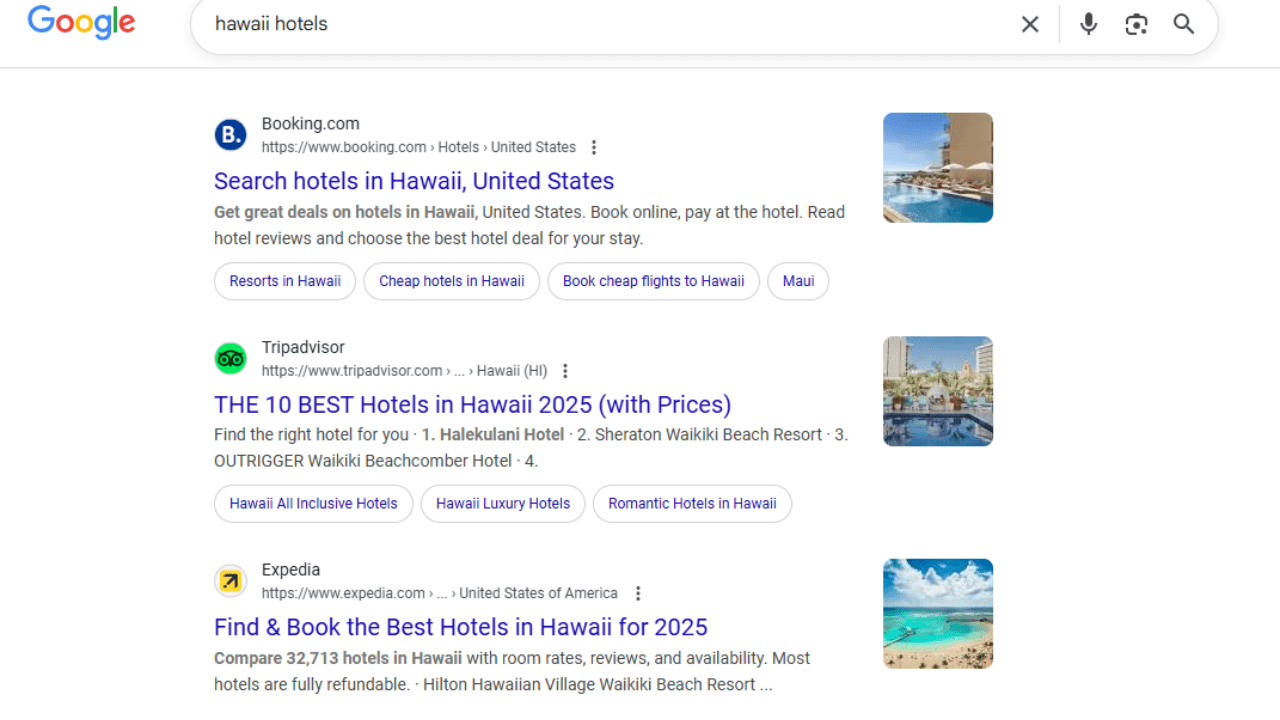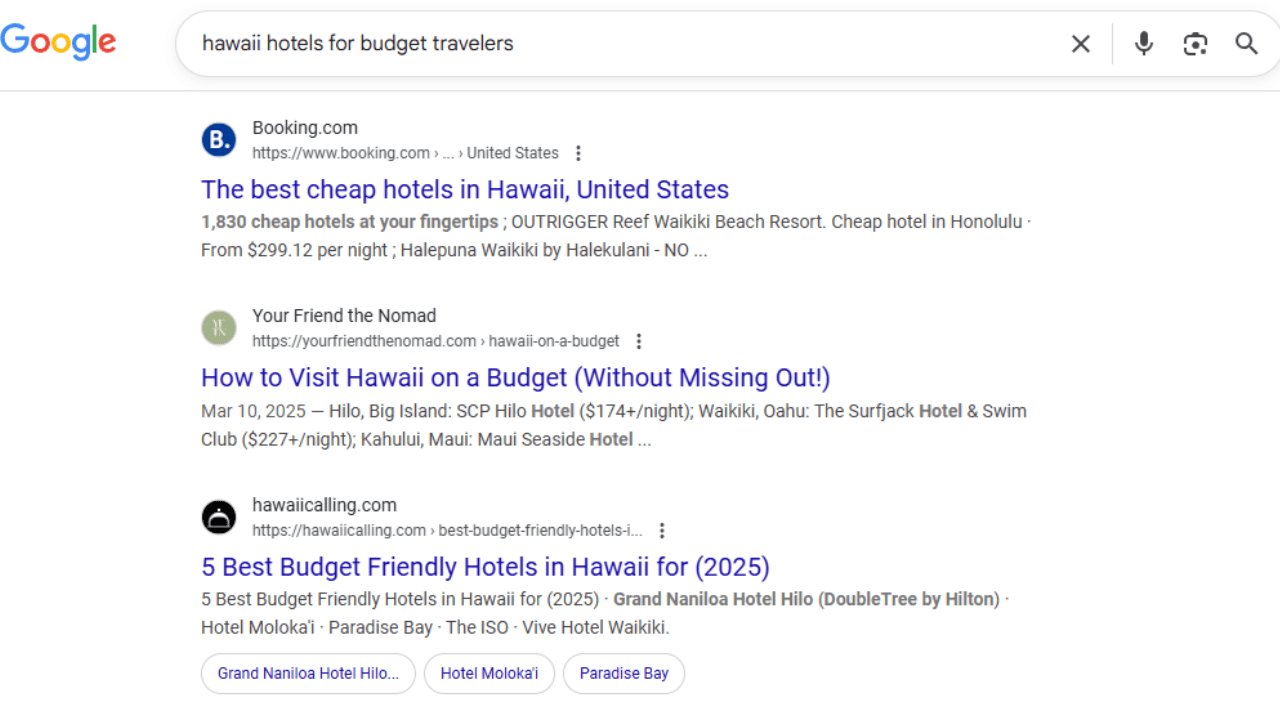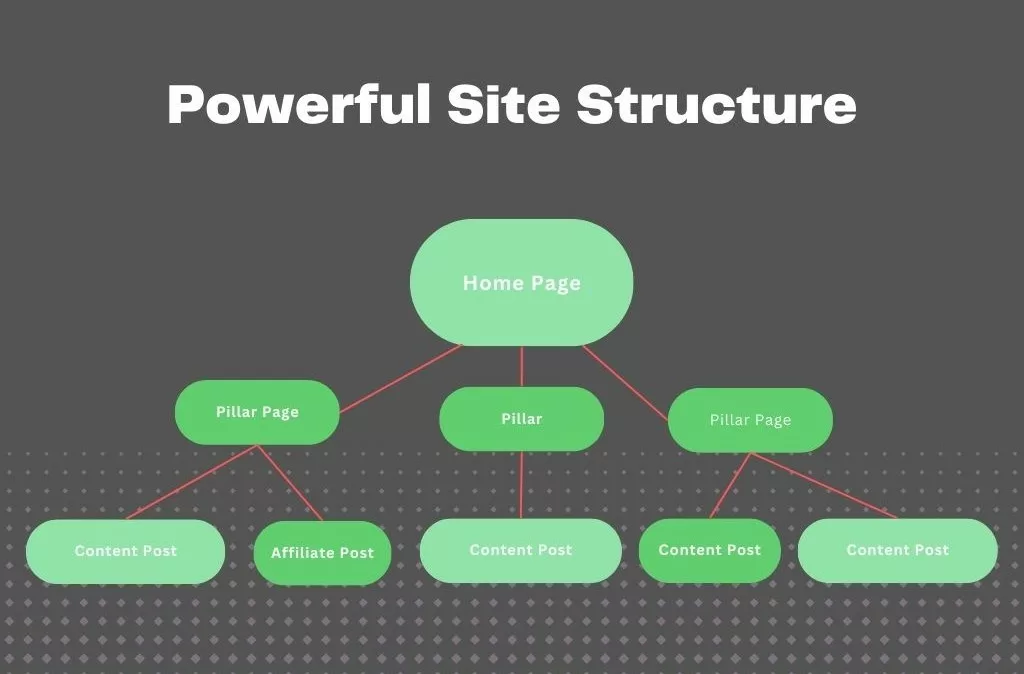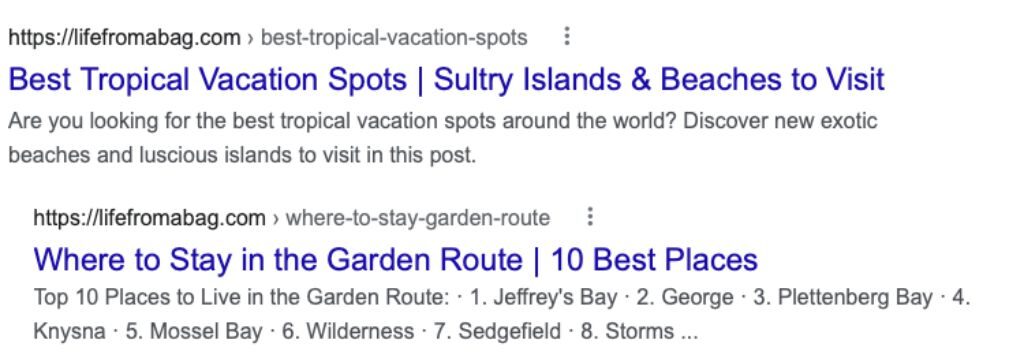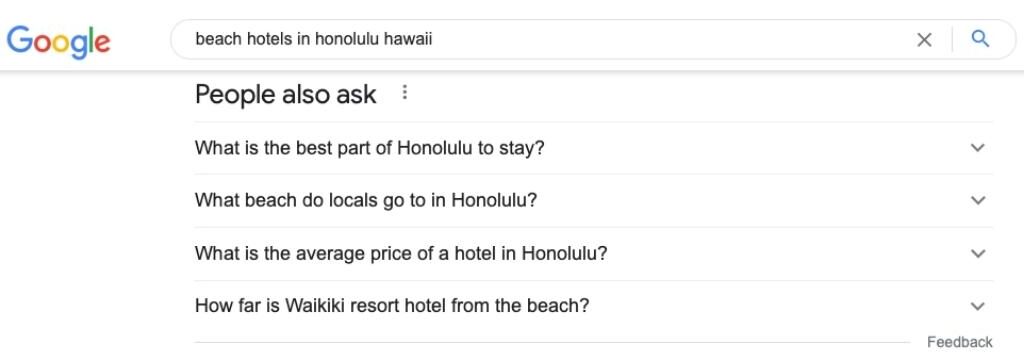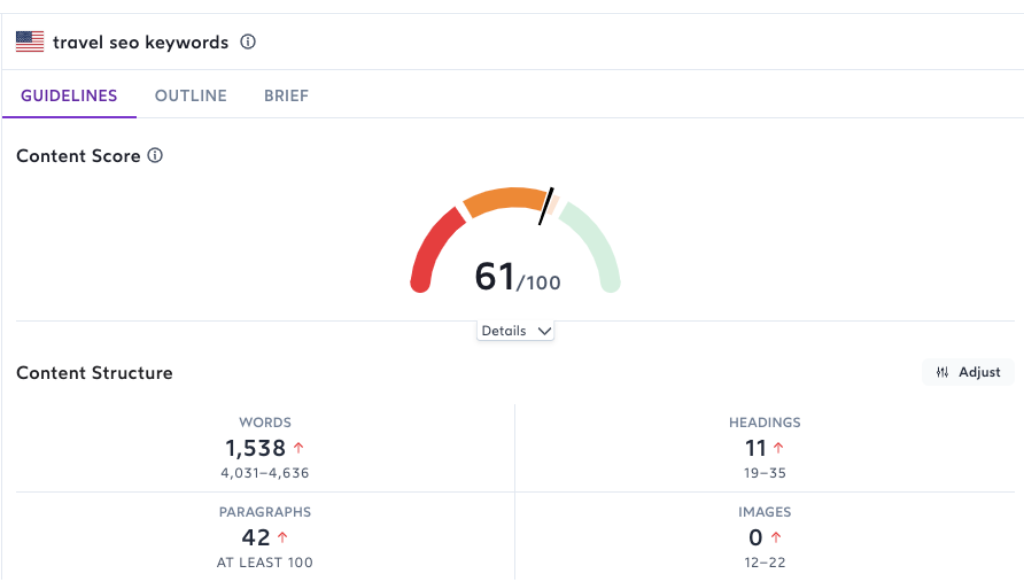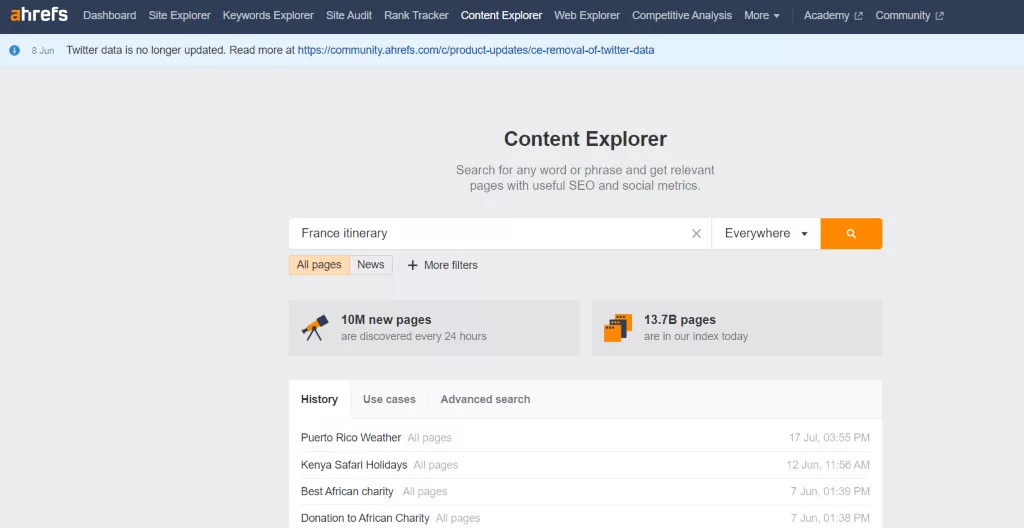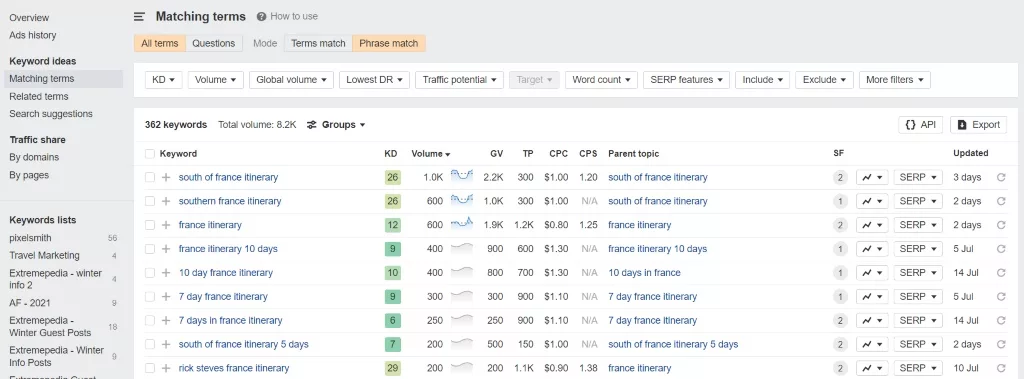

How to Find the Top Travel Keywords for Your Website
To run a successful travel business online, you need to use the right keywords. Many website owners and businesses in the tourism industry often overlook travel keywords, leading to wrong targeting and wasted time and money. Want to rank at the top of the SERPs? This is for you!
This deep dive unpacks everything you need to know to get your website on the first page of search engines like Google and even appear in answers from AI tools such as ChatGPT. It covers what travel keywords are, what to consider when choosing them, how to use them, and where you can find the best ones for your site. Let’s dive in.
What Are Travel SEO Keywords?
Keywords are the terms, phrases, or queries people enter into search engines such as Google and Bing. SEO travel keywords are specific to the tourism niche. These terms are essential SEO strategy components, helping travel websites and blogs rank high in the search results.
Appearing at the top of the search engine results pages (SERPs) is not just about getting the most clicks. It’s also a trust signal to searchers that your website or blog has authority in the field. This has the potential to turn casual browsers into bookings and paying customers.
Types of SEO Travel Keywords
There are two main types of keywords in SEO, namely, broad and long-tail. Broad keywords are typically single words or short terms that cast a wide net. On the other hand, long-tail keywords, as the name suggests, are multiple-word phrases and are generally more specific or niche.
Broad Travel Keywords
The screenshot below shows search results for a broad keyword, “Hawaii hotels”. The top positions are occupied by Booking.com, Tripadvisor, and Expedia; these are all giants in the travel business.
It will be nearly impossible for your travel website or blog to compete with these brands unless you are one of them. That’s why targeting broad keywords may not be the best SEO strategy for your business.
(Example of a Google Search for a Broad Keyword, “Hawaii hotels”)
Long-Tail Travel Keywords
Long-tail keywords are more specific, so they tend to include more modifiers, making them easier to target and rank for. Take the screenshot below, for example: “hawaii hotels for budget travellers” still features Booking.com, but it also includes results from blogs and local sites.
The long-tail keyword only targets people looking to stay in Hawaii for a lower cost. While these keywords are less searched, you’re more likely to rank for this phrase as it speaks directly to searchers’ preferences. Other things to look for when choosing your long-tail keywords are high volume and low difficulty.
(Example of a Google Search for a Long-tail Keyword, “Hawaii hotels for budget travellers”)
Benefits of Using SEO Keywords for Your Travel Website
A good SEO strategy using keywords can help your site get higher search rankings and increase direct bookings. That’s good and well, but it doesn’t end there. You can also build a strong keyword funnel that allows you to identify and categorise your content by popular search terms.
This is “content marketing”, and using the right keywords is one of the core aspects of having a strategy that converts visitors into customers. You’re welcome to target any keywords that are relevant to your business, but here are some benefits of using SEO-powered terms as well.
1. Improves Website Structure
The most notable benefit is how keywords help structure your website. Having your broad terms as pillar posts or category pages and long-tail keywords as supporting content allows you to create a web-like structure from which your content flows.
A great example of this is a travel agency offering tour packages. If your site covers global travel, creating category or niche pages for every country you service is a fantastic start.
From there, you can include city or attraction-specific tours that target the highest-volume and easy-to-rank keywords for that specific country. This web-like structure also allows your targeted audience to navigate the website easily, providing them with the best possible user experience.
2. Attracts Relevant Traffic From High-Volume Keywords
Another benefit of having a keyword strategy is that it allows you to target high-volume, easy-to-rank-for keywords that match search intent. This relevance is priceless.
Let’s say you’re looking for keywords for your travel blog, and you’ve already extensively covered the topic “tropical vacations”. You have written about all the possible destinations under this niche, but that doesn’t mean you’ve answered all the top search queries about this topic.
For example, your audience may want to know about the “cheapest all-inclusive vacations in the Seychelles” or the “best cruise tour operators in Bali.” These are potentially easy-to-rank-for, high-volume keywords you haven’t covered under the broad keyword “tropical vacations.”
Strike a balance between relevant and high-volume keywords for an exponential impact.
3. Gives You a Competitive Advantage
The travel industry is a highly competitive environment. So even with a good-looking website and killer content, your site might still fall short of the coveted top spot. Why? Competition!
You may be doing all the right things, but still get beaten out by rivals because they’re targeting the exact keywords. That’s where travel SEO comes in. One of our most in-demand services as a travel SEO agency is a comprehensive content audit, which includes a competitor analysis.
During the analysis, we identify content gaps; these are keywords that your top competitors are ranking for, and you’re not. This can help you stand out from the crowded market.
Types of Travel Keywords to Consider
Knowing the difference between broad and long-tail keywords isn’t enough. It goes a step further. When a user types in the search bar, they’re looking for something specific.
It’s all about search intent. What are they looking for exactly? Is it to find out more information, to compare two or more products, or to buy something? These are intent-specific keywords. Knowing the intent can help you determine the potential outcome. Let’s dig a little deeper.
Informational Intent Keywords
Users looking to broaden their knowledge on a particular topic often have an informational intent. The content you provide for these keywords will need to answer the reader’s search query and is usually the start of a user’s buying journey.
This is where a systematic approach to the content is crucial. You don’t want to attract potential customers only to have a high bounce rate because you’re not answering their questions.
Having high-quality content with valuable information on your travel website communicates your trustworthiness to the user. This encourages them to continue exploring your site and leads them to supporting pages with niche information, your services or products, or affiliate links.
Here’s a great example: an information page covering the “best hiking trails in Cape Town” can internally link to a potential income-generating page such as “guided hiking tours in Cape Town”.
Navigational Intent Keywords
These keywords usually draw traffic directly to your site. In most cases, users with a navigational intent have a level of trust in the site and have become regular visitors.
Popular tour companies such as Get Your Guide and Viator often receive visitors due to this keyword type. With high-quality informational content, you can easily increase visitors with navigational intent, as they may be seeking your trusted opinion on a particular topic.
Instead of typing “Cape Town airport shuttle service”, a user might search for “airport shuttle Cape Town airport Get Your Guide”. They’re looking for a service from this particular brand.
Commercial Intent Keywords
If you’re looking to provide valuable information while also capitalising on income-generating potential, it’s best to target this search intent. More often than not, users are simply browsing products for potential purchase or looking to further their knowledge about said items before committing to buying.
A good example of this might be “best boat cruises in Cape Town”. You can genuinely provide beneficial information to readers with this content and still offer bookable tours on the topic.
Transactional Intent Keywords
These refer to terms users search with the intention of making a purchase. While it may be similar to commercial intent keywords, here the user already knows that they want to make a transaction, and is eagerly looking for products to purchase.
An example might be “cheap flights from London to Cape Town” or “affordable travel insurance packages”. While you can provide valuable and relevant information on these topics, the user’s primary goal with these search terms is to make an immediate purchase.
How to Use SEO Keywords for Travel and Tourism?
SEO keywords need to be strategically placed in titles, meta descriptions, and the content. These are three of the most important elements displayed in the SERPs, so optimising them is essential for your travel website or blog’s visibility and ranking.
1. Incorporate Keywords In Titles
The page title is vital as it tells users and search engines what your website or posts are about. For this reason, you should ensure that your page title is SEO-friendly to both people and bots.
For an SEO-friendly page title, keep the following in mind:
- Humans decide whether or not to click, so make your page title catchy and enticing.
- Ensure your target keyword appears in your page title, preferably near the beginning.
- Keep your page title between 50 and 60 characters, or 580 pixels long.
- Avoid including the target keyword in the title more than once. This is keyword stuffing.
- Include strong modifiers in your page title. These are words that will help your page rank for related search terms.
(The image above shows a strong modifier “cities” being used. This can help the post rank for a related query, such as “best cities to live in South Africa”.)
2. Add Target Keyword to the Meta Description
The meta description, along with the page title and URL, appears in the SERPs as a snippet. As such, optimising this can greatly influence your click-through rate (CTR).
Here are some tips for an SEO-friendly meta description:
- Include the target keyword or synonyms in the meta description.
- Have the target keyword in the first sentence of the meta description.
- Your meta description should be between 50 and 160 characters, or 400 pixels to 920 pixels in length. Search engines generally cut off anything past this length, and if it is shorter than 50 characters or 400 pixels, it likely won’t be included.
- Use catchy travel words, or pose a question or call to action to draw in the audience.
3. Make the URL User and SEO-Friendly
The webpage URL is essential for ensuring your travel content is seen. A relevant URL will help search engines categorise your content and thus increase its likelihood of ranking in SERPs.
To optimise this, follow these steps:
- Contain the target keyword, as it tells users and search engines what the page is about.
- Make it short, clear, and easy to understand.
- Avoid additional words, symbols, special characters, or numbers.
(The image above shows an optimised snippet. The target keyword (best tropical vacation spots) appears in the URL, meta description, and page title. Additionally, both the page title and meta description are catchy and of an ideal length.)
4. Add Keywords Related to Travel In The Content
Based on your keyword research, you will want to include various keywords throughout your content. These should relate to your topic or main keyword.
For example, if you’re writing about “hotels in Hawaii on the beach”, you’ll likely find plenty of other keywords similar to this, such as “Hawaii beach hotels”, that will also help you rank.
Quick Case Study: Finding The Best Keywords for Hotels
The travel industry is highly competitive, and no one knows that more than a hotel marketer or owner. Getting direct bookings and ranking for broad keywords can seem nearly impossible, but with the right strategy, you can find SEO keywords for hotels that will bring in more bookings.
As an SEO travel agency, we’ve worked with many hotels looking to ditch the OTAs and boost direct bookings. To give you a good idea of what to look out for, we’ve crafted a list of 20 top hotel keywords to showcase the range of topics you can try to target in your strategy.
| Keyword | Search Volume | Intent |
| 7 star hotel | 20000 | Informational, Non-branded, Non-local |
| how old do you have to be to get a hotel room | 14000 | Informational, Non-branded, Non-local |
| istanbul airport hotel | 13000 | Informational, Commercial, Non-branded, Local |
| near me hotel | 12000 | Informational, Commercial, Transactional, Non-branded, Local |
| near hotel | 11000 | Informational, Commercial, Transactional, Non-branded, Local |
| airport hotel | 11000 | Informational, Commercial, Non-branded, Non-local |
| hotel with jacuzzi in room | 9200 | Informational, Commercial, Non-branded, Non-local |
| kerala hotel near me | 9000 | Informational, Commercial, Non-branded, Local |
| hotel near by me | 8500 | Informational, Commercial, Transactional, Non-branded, Local |
| hotel con jacuzzi | 8000 | Informational, Commercial, Non-branded, Non-local |
| 7 star hotel in india | 7800 | Informational, Commercial, Non-branded, Local |
| hotel met jacuzzi op kamer | 7700 | Informational, Commercial, Non-branded, Non-local |
| hotel with hot tub in room | 7500 | Informational, Commercial, Non-branded, Non-local |
| barcelona airport hotel | 7500 | Informational, Commercial, Non-branded, Local |
| orlando airport hotel | 7500 | Informational, Commercial, Non-branded, Local |
| best hotel in dubai | 7400 | Informational, Commercial, Non-branded, Local |
| best hotel in london | 7400 | Informational, Commercial, Non-branded, Local |
| pet friendly hotel | 7000 | Informational, Commercial, Non-branded, Non-local |
| hotel with pool near me | 6800 | Informational, Commercial, Non-branded, Local |
How to Find the Top Travel Keywords for SEO
The first way to find good travel SEO keywords is through your expertise. If you’re an expert and know about specific destinations, then use that knowledge to write articles based on where you’ve been or things in the industry that interest you.
The next step is to make sure the search term you’re targeting is actually being searched for. There are several keyword research tools, both free and paid, that you can use to help with this. Popular picks include Ahrefs, Google Search Console, SEO Surfer, and Ubersuggest.
These tools provide a wide range of practical insights to validate targeting a given keyword. Some valuable data provided includes the amount of traction a keyword receives each month (in traffic and volume), whether or not the keyword will be easy to rank for, and plenty more.
Consider these insights to create content that best aligns with your target audience’s intent.
Social media platforms such as Pinterest, Instagram, Facebook, and X (formerly Twitter) can also provide you with a number of useful insights. These platforms are beneficial for understanding your target audience and the queries they’re searching for.
Below is a detailed guide on how to leverage each of these tools to find strong keywords and opportunities for your travel site or blog.
1. Ahrefs
Ahrefs is an SEO software suite offering a variety of tools that are great for keyword research, link building, rank tracking, and more. The keyword research tool is useful for identifying topics for your travel website and the keywords you should include and prioritise in your content.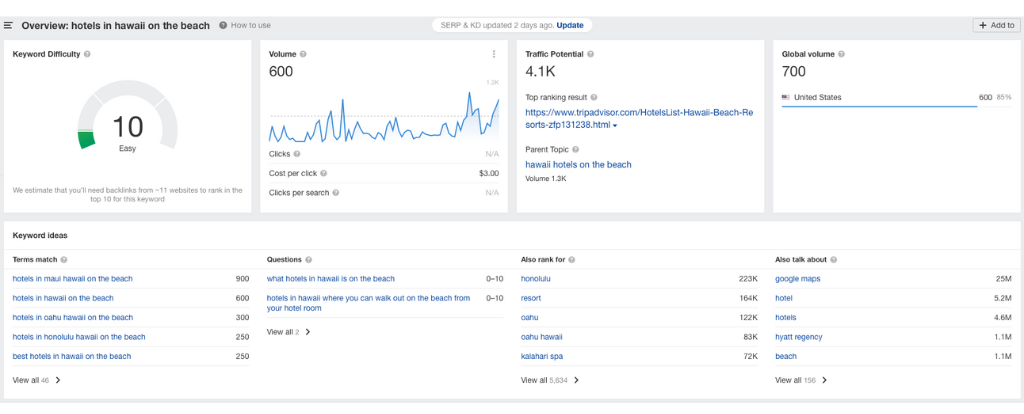
(A screenshot of the Ahrefs dashboard showing results for “hotels in hawaii on the beach”)
By leveraging Ahrefs data, many travel marketers and SEO experts are able to achieve higher search engine rankings. To make things even better, the Ahrefs blog is an open source of tips and tricks to help you maximise the different tools in the suite.
Note: Ahrefs is a premium tool, but it has great features that help get more traffic. If SEO is your thing, then we highly recommend taking the time to sign up for this monthly service.
2. Google Search
If you’re not looking to pay a monthly subscription fee, don’t worry, there are plenty of ways to find strong keywords and topics without spending a cent. One powerful tool is Google Search.
You can type the query you wish to target into the search engine and see what comes up in the SERPs. It’s particularly beneficial to investigate the “People Also Ask” section, as it includes additional information on what users may also be looking for based on their initial query.
(A screenshot of a Google search showing results for “beach hotels in honolulu hawaii”)
3. Google Search Console
In addition to the Google Search function, you can use Google Search Console (GSC) to find your travel keywords. This is a free tool, but using the AdWords function will incur an additional cost.
GSC helps you perform your keyword research and identify possible search campaigns. Similar to Ahrefs, this will provide you with data about how many searches a keyword is getting. Another great feature is that it allows you to see which keywords you are already receiving clicks and impressions for, which can help you decide if optimising a certain page is necessary.
GSC is also great for those running Google Ads, as you can also expect more insightful information, such as the estimated cost of targeting a given keyword.
(A screenshot showing Travel Tractions’ performance on the Google Search Console dashboard)
4. Social Media
An often overlooked free resource for researching the best keywords for travel is social media. While it is not necessarily a keyword research tool in the traditional sense, it is an excellent source for finding medium and long-tail keywords with high traffic and search volume.
Social media platforms are constantly gathering information on people, including what they do, what they like, where they go, and what might prompt them to click. Given that the average user spends over two hours a day on these platforms, you can expect some good, reliable data.
Various social media platforms can be leveraged in different ways.
Here is a brief look at how to use each for keyword research:
- Instagram: Use hashtags to identify relevant topics. For example, if you want to post travel content, search #travel and see what other hashtags recent posts are using.
- Facebook: Use targeting options to learn about your audience or search travel-related Facebook groups for popular topics.
- X (Twitter): Use the Explore function and see what topics appear under “trending” and “for you”. This highlights topics that people in your industry are talking about.
- Pinterest: Use the search function and analytics to identify popular searches and related themes. You’ll find plenty of topics through pins, boards, and hashtags.
- YouTube: Use the auto-complete function to find related terms. This can be done using Google and Pinterest as well. You can also check out the various travel YouTube tags.
Note: Some social media platforms, like X (Twitter), require more activity to reap the rewards.
5. Keysearch
Similar to Ahrefs, KeySearch is a premium tool used for finding keywords. It allows you to effectively track your SEO efforts, identify keywords that you’re likely to rank for, and more.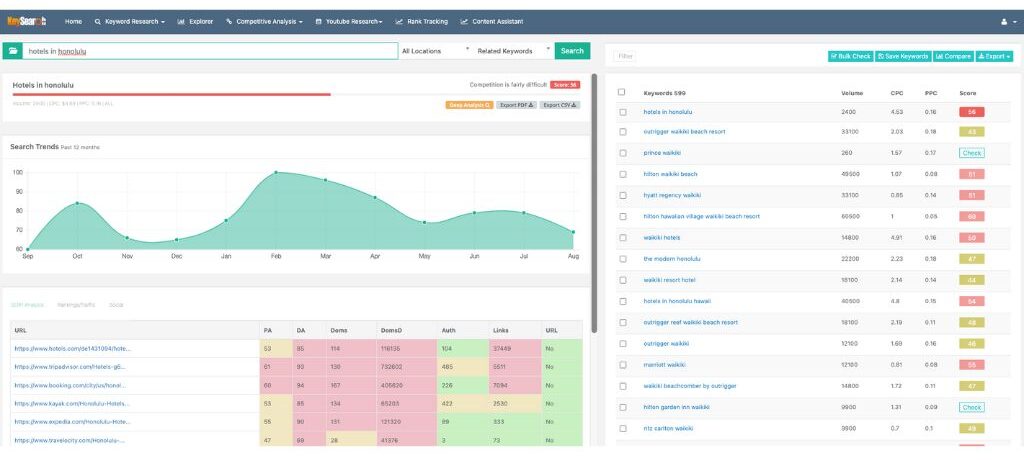
(A screenshot showing results for “hotels in honolulu” on the KeySearch dashboard)
The free version of this tool provides basic information, but its Starter Pack ($24) offers more features, such as tracking and audits, which significantly enhance SEO campaigns. Considering the insights you receive, it’s not too costly, so we recommend signing up for the paid version.
6. Ubersuggest
Ubersuggest is another great tool for finding keywords. It’s not as robust a program as Ahrefs, but it has some really good features and can be helpful if you’re just getting started in SEO or have an existing website that needs help.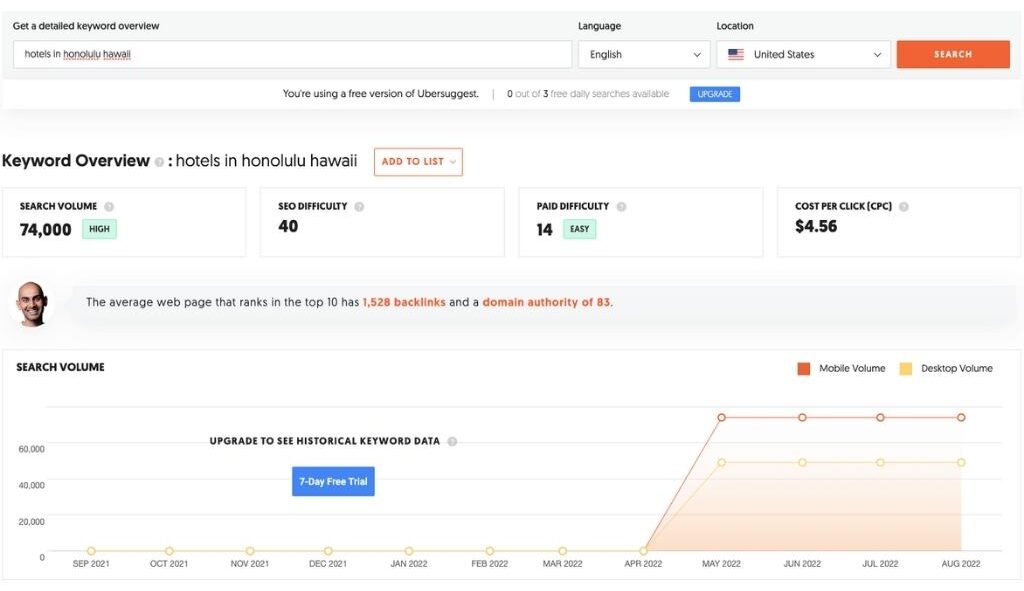
(A screenshot showing results for “hotels in honolulu hawaii” on the Ubersuggest dashboard)
Ubersuggest has a free Chrome extension that provides various insights, including keywords, monthly search volume, cost per click, and competition data. Simply enter the keyword or phrase you’re after, and it will bring up all the most popular pages for that term.
It’s also not limited to keywords specific to Google, but covers sites like Amazon and YouTube as well. So, expect to find a variety of topics and long-tail travel keyword lists using this free tool.
7. SEO Surfer
Similar to Ahrefs, Surfer SEO provides keywords to use in your content. It takes the primary keyword you enter, scans the web for competitors who are already ranking for that targeted search term, and how many times they’re using it to give you an estimate of what your content score should be to compete in the SERPs. It offers audits, competitor analysis, and more.
( A screenshot showing results for “travel seo keywords” on the SEO Surfer dashboard)
You will be able to see these keywords on the SEO Surfer website or by using the Chrome extension. It shows you the keywords, how often you should use them, and the content score.
In addition to that, Surfer SEO provides several other metrics to help you write and optimise your content. These include the average word count that the post should be, how many headings the post should have, what keywords to include in those headings, and more.
A Quick Note on Keyword Modifiers
Keywords are a powerful aspect of a travel site’s SEO, but tracking the modifiers is also crucial. These words and phrases are regularly added to the target keyword by search engine users.
Incorporating popular modifiers throughout your content can play a significant role in helping you rank high in SERPs. Keep in mind, these terms or phrases should still be added naturally.
The Negative Effects of Keyword Stuffing
Keyword stuffing is a technique that involves manipulating search rankings by overusing keywords and phrases within content. While this was a powerful strategy of the past, it’s now seen as Black Hat SEO and forms part of the list of Google penalties your site can endure.
There is no formula to avoid keyword stuffing. But the best practice is to keep your content reader-focused and user-friendly and only naturally incorporate keywords where possible.
Our Processes for Finding the Best Keywords for Travel Bloggers
If you sign up for one of our travel SEO services, you may need assistance finding related keywords to your travel niche. These processes require an analytical approach to identify keywords for already written content and find the best possible options for future content.
Here’s a basic breakdown of each process and the key differences between them.
1. Topic Mine
A topic mine helps identify easy-to-rank keywords that can bring in the highest possible traffic to your site. There are different kinds of mines: phrase match, competitor mine, and GSC mine.
These use different approaches to find the most relevant keywords. For instance, if the target keyword is “France itinerary”, a topic mine may reveal that related phrases such as “France travel”, “France holiday”, or “France vacation” have high traffic, volume, and low difficulty.
(A screenshot showing the Ahrefs Content Explorer dashboard)
For a standard topic mine, we will run the target keyword “France itinerary” through Ahrefs’ Content Explorer. The tool then shows us a list of words, terms, or phrases with their corresponding data: traffic, volume, and keyword difficulty. We then identify the best topics to write on and prioritise them within a strategically formatted sheet.
2. Phrase Match Mine
A phrase match mine is a special type of topic mine. Usually, there is a predetermined content series you will want to write about, such as “luxury hotels in X” or “best places to visit in Y”.
Using the Ahrefs Phrase Match tool, we can find the best keywords matching the given phrases. This process helps identify keywords that your site is most likely to rank for in a particular series.
This way, you are not wasting time and money writing high-difficulty topics with less traffic.
(A screenshot showing Ahref’s Phrase Match tool dashboard)
3. Competitor Mine
Another popular topic mining process is the competitor mine. As the name suggests, this involves finding all the high-traffic, easy-to-rank keywords that your competitors are ranking for.
We usually ask who your top three competitors are or perform a quick site search on Ahrefs to identify them. Then we examine their keywords and find the best topics your site can rank for.
FAQs About Travel Keywords for Blogs and Websites
Here are brief answers to some common questions we get about travel keywords.
What Is the Key to Successful Keyword Selection?
Selecting the right keywords relies on relevance, keyword difficulty, and medium to high traffic and search volume. If you can find keywords that align with your content, are regularly searched for by users, and don’t have a lot of competition, then you’re firmly on your way to the first page.
How to Find the Best Keywords for Blogs?
You can find keywords everywhere, from free social media platforms to paid keyword research tools such as Ahrefs and Surfer SEO. To find the best keywords for your blog, first look at what your target audience wants to know about and combine that with low difficulty, high traffic terms.
How Many Keywords to Target per Blog?
The golden rule is one. You don’t want to confuse search engines and even readers, for that matter, by targeting multiple keywords in one blog post. However, you can use related terms and phrases as supporting keywords in secondary headings (H2 – H6) as well as in the content.
Are Long-Tail Keywords Expensive?
No. Long-tail keywords are quite easy to find and mostly do not require any payment. Google’s auto-complete function when searching is a great way to find these kinds of keywords. You can also look at the “People Also Ask” section for more queries that can serve as long-tail.
Best Keywords for Travel: Wrapped Up
A travel keyword strategy may be the missing piece to your plan of ranking high in the SERPs. But with this deep dive, you’re armed with information that will turn your traffic into bookings.
From the types of travel keywords to the myriad of free and paid tools to use, this guide gives you a competitive edge. Whether you use Ahrefs, SEO Surfer, Google, or just social media, you’re sure to find some of the most searched queries within the travel space.
So no more wondering where to start. Do some keyword research and be on your way up!

